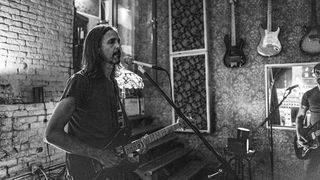Hardcore punk music is simple by design and tribal by nature, focused on eliciting a specific response as opposed to encouraging exploration. It’s ironic, then, how hardcore journeyman Walter Schreifels has somehow evaded the genre’s structures to create some of the most compelling and influential heavy music of the last three decades.
“Hardcore is such a limited format, in a way – it’s more like haikus than sonnets,” Schreifels says. “When I got into Quicksand, I didn’t want to work within the boundaries of that formula of hardcore. I wanted to stretch out, and the guys I was working with all wanted to do that as well.”
Of all the groundbreaking bands Schreifels has been involved with – '80s hardcore pioneers Youth of Today and Gorilla Biscuits, and early-aughts alt-metal underdogs Rival Schools chief among them – Quicksand will be writ large in his epitaph. Emerging in 1993 with their debut album Slip, Quicksand bridged the worlds of punk and metal while maintaining the bludgeoning beats of hardcore – the perfect concoction for music fans who loved Nirvana and Helmet in equal measure.
Schreifels had grown up in New York on bands like AC/DC, the Smiths, Echo and the Bunnymen and the Velvet Underground before discovering punk at CBGB’s hardcore matinee shows. He realized that even his meager musical abilities were good enough to start a band, so he formed Gorilla Biscuits. He loved how the barrier between bands and fans was always blurred, and because of the music’s simplicity he sometimes filled in with bands like Judge, often learning the set on the way to the gig.
“Hardcore has this family vibe where you jump in [to help other bands],” he says. “You know, ‘Billy’s parents said he can’t go to Connecticut to play a show, so do you want to play?’ The good thing was that the songs weren’t hard, and no one cared – that was the other part. [Laughs] In hardcore, it wasn’t that important to play great as it was to just be about it.”
By the time he formed Quicksand, Schreifels had become more ambitious in his guitar playing and songwriting, taking notice of Brian Baker’s octave melodies in Dag Nasty, the angularity of Greg Ginn’s work in Black Flag, the dissonance of BL’AST!, and the use of space by Jane’s Addiction.
“We did a tour in England and got ahold of a My Bloody Valentine cassette,” he says, “and by the time we did Slip, that was our biggest influence. I don’t know how much it comes off as sort of, ‘Oh, they’re doing shoegaze,’ but that’s what we were doing.”
After performing on the inaugural Warped Tour in 1995 and releasing Manic Compression – winkingly named for the record’s tightly wound mix, which bassist Sergio Vega dubbed the … And Justice for All of hardcore, according to Schreifels – Quicksand splintered.
Schreifels launched Some Records and put out Hot Water Music’s seminal No Division, and formed Rival Schools with friends from the New York hardcore scene. With a more streamlined, melodic hard rock sound, the band landed the single Good Things in rotation on MTV2, but soon Schreifels moved on to the British Invasion power pop of Walking Concert. Non-stop moving is the only constant in his long and prolific career.
“I guess it’s that hardcore community thing where bands wouldn’t really last for more than a record, and that would be your career,” he says. “I may have carried that mentality into my pro career, to where I wanted to work with different people and create different sounds.”
We didn’t want to rehash ourselves, mainly because I don’t think we would’ve done a good job of it
Reforming Quicksand in 2012, and Rival Schools the year before, bucked this trend – but they didn’t recycle old riffs or themes. He and Vega, who had been playing with Deftones, brought new perspectives and a more progressive musical mindset to the music they created for 2017’s Interiors.
“There was no master plan,” he says. “We all had to regain our chemistry and figure out, what is our style at this point? What we all agreed on was that we didn’t want to rehash ourselves, mainly because I don’t think we would’ve done a good job of it. We had all progressed as players in so many different ways, and as people even more so. Even if you wanted to, that time is over. How do you recontextualize it? It took us a while to get a handle on it.”
Since then, his guitar playing has taken new forms. After second guitarist Tom Capone left Quicksand abruptly during the Interiors tour, Schreifels had to learn to cover both rhythm and lead; the same thing had happened before a 2011 Rival Schools tour, when Ian Love quit. Each time, he emerged a stronger player, and has channeled those lessons into Dead Heavens, his bluesy proto-metal band, and Distant Populations, Quicksand’s 2021 release.
“I think I have a good sense of how to improvise and make it sound cool, and I use the tricks I have to the most effect that I can,” he says. “And I think that’s the trick of my playing. Depending on what you’re going for, there’s always gonna be different levels of technical skill. It’s what you do with it.”
- Distant Populations is out now via Epitaph.


